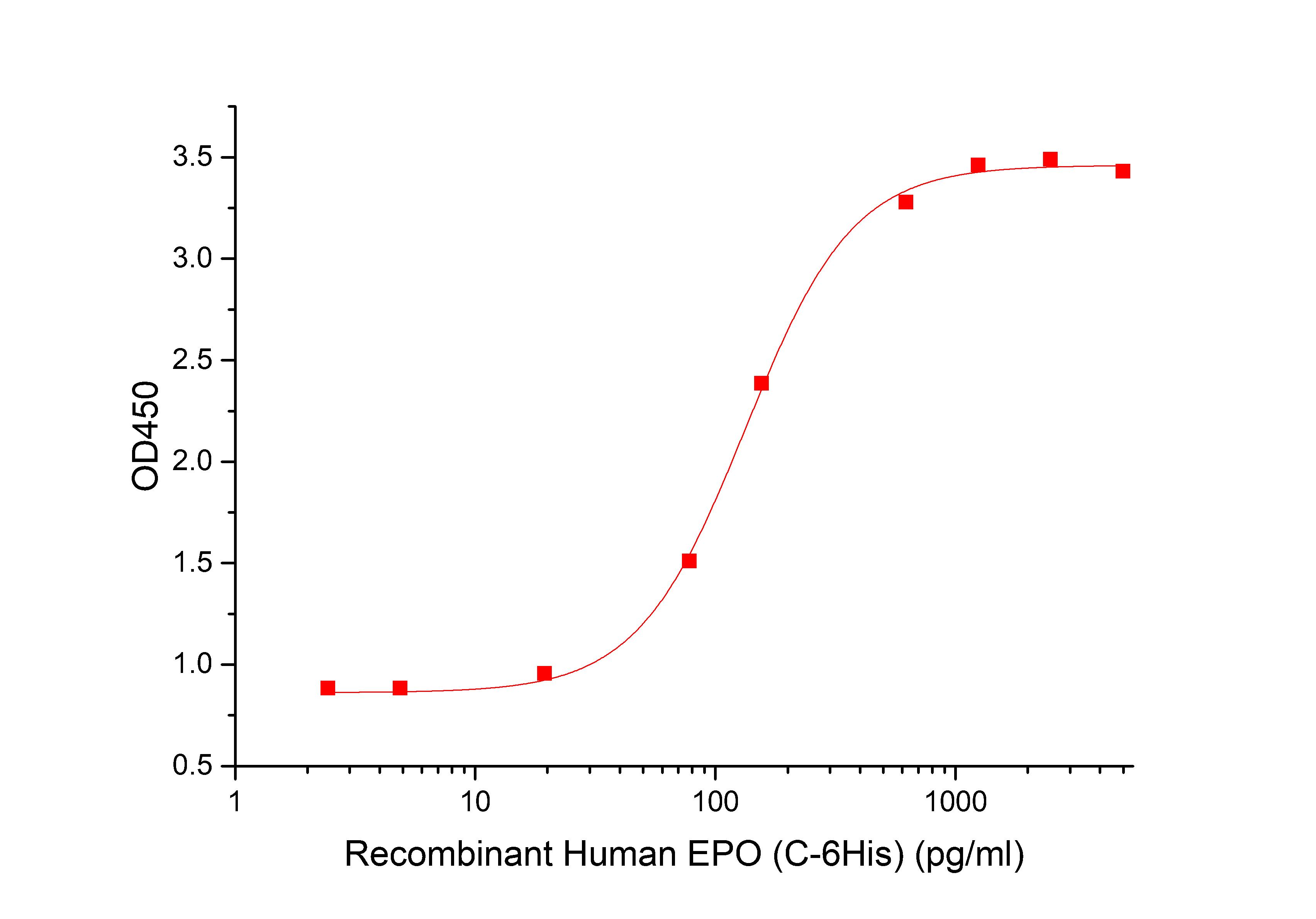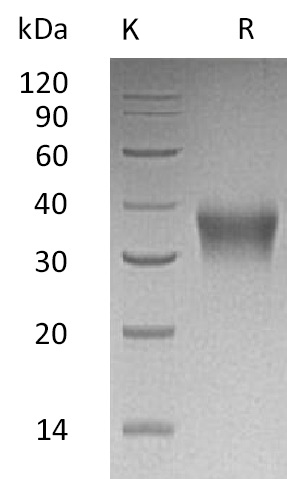- 全部删除
 您的购物车当前为空
您的购物车当前为空
EPO/Erythropoietin Protein, Human, Recombinant (His)
Erythropoietin (EPO) is a glycoprotein hormone that is principally known for its role in erythropoiesis, where it is responsible for stimulating proliferation and differentiation of erythroid progenitor cells. Erythropoietin is a member of the EPO/TPO family. It is a secreted, glycosylated cytokine composed of four alpha helical bundles. The differentiation of CFU-E (Colony Forming Unit-Erythroid) cells into erythrocytes can only be accomplished in the presence of EPO. Physiological levels of EPO in adult mammals are maintained primarily by the kidneys, whereas levels in fetal or neonatal mammals are maintained by the liver. EPO also can exert various non-hematopoietic activities, including vascularization and proliferation of smooth muscle, neural protection during hypoxia, and stimulation of certain B cells. Genetic variation in erythropoietin is associated with susceptbility to microvascular complications of diabetes type 2. These are pathological conditions that develop in numerous tissues and organs as a consequence of diabetes mellitus. They include diabetic retinopathy, diabetic nephropathy leading to end-stage renal disease, and diabetic neuropathy.

EPO/Erythropoietin Protein, Human, Recombinant (His)
| 规格 | 价格 | 库存 | 数量 |
|---|---|---|---|
| 10 μg | ¥ 540 | 现货 | |
| 50 μg | ¥ 1,650 | 5日内发货 | |
| 500 μg | ¥ 12,100 | 5日内发货 | |
| 1 mg | ¥ 17,400 | 5日内发货 |
产品信息
| 生物活性 | Measured in a cell proliferation assay using TF‑1 human erythroleukemic cells. The ED50 for this effect is 80-250 pg/ml. (QC verified)  |
| 产品描述 | Erythropoietin (EPO) is a glycoprotein hormone that is principally known for its role in erythropoiesis, where it is responsible for stimulating proliferation and differentiation of erythroid progenitor cells. Erythropoietin is a member of the EPO/TPO family. It is a secreted, glycosylated cytokine composed of four alpha helical bundles. The differentiation of CFU-E (Colony Forming Unit-Erythroid) cells into erythrocytes can only be accomplished in the presence of EPO. Physiological levels of EPO in adult mammals are maintained primarily by the kidneys, whereas levels in fetal or neonatal mammals are maintained by the liver. EPO also can exert various non-hematopoietic activities, including vascularization and proliferation of smooth muscle, neural protection during hypoxia, and stimulation of certain B cells. Genetic variation in erythropoietin is associated with susceptbility to microvascular complications of diabetes type 2. These are pathological conditions that develop in numerous tissues and organs as a consequence of diabetes mellitus. They include diabetic retinopathy, diabetic nephropathy leading to end-stage renal disease, and diabetic neuropathy. |
| 种属 | Human |
| 表达系统 | HEK293 Cells |
| 标签 | C-6xHis |
| 蛋白编号 | P01588 |
| 别名 | 红细胞生长素,Erythropoietin,Epoetin,EPO |
| 氨基酸序列 | Ala28-Arg193 |
| 蛋白构建 | Ala28-Arg193 |
| 蛋白纯度 | Greater than 95% as determined by reducing SDS-PAGE. (QC verified)  |
| 分子量 | 30-40 kDa (reducing condition) |
| 内毒素 | < 0.1 ng/µg (1 EU/µg) as determined by LAL test. |
| 缓冲液 | Lyophilized from a solution filtered through a 0.22 μm filter, containing PBS, pH 7.4. |
| 复溶方法 | Reconstitute the lyophilized protein in distilled water. The product concentration should not be less than 100 μg/ml. Before opening, centrifuge the tube to collect powder at the bottom. After adding the reconstitution buffer, avoid vortexing or pipetting for mixing. |
| 存储 | Lyophilized powders can be stably stored for over 12 months, while liquid products can be stored for 6-12 months at -80°C. For reconstituted protein solutions, the solution can be stored at -20°C to -80°C for at least 3 months. Please avoid multiple freeze-thaw cycles and store products in aliquots. |
| 运输方式 | In general, Lyophilized powders are shipping with blue ice. Solutions are shipping with dry ice. |
| 研究背景 | Erythropoietin (EPO) is a glycoprotein hormone that is principally known for its role in erythropoiesis, where it is responsible for stimulating proliferation and differentiation of erythroid progenitor cells. Erythropoietin is a member of the EPO/TPO family. It is a secreted, glycosylated cytokine composed of four alpha helical bundles. The differentiation of CFU-E (Colony Forming Unit-Erythroid) cells into erythrocytes can only be accomplished in the presence of EPO. Physiological levels of EPO in adult mammals are maintained primarily by the kidneys, whereas levels in fetal or neonatal mammals are maintained by the liver. EPO also can exert various non-hematopoietic activities, including vascularization and proliferation of smooth muscle, neural protection during hypoxia, and stimulation of certain B cells. Genetic variation in erythropoietin is associated with susceptbility to microvascular complications of diabetes type 2. These are pathological conditions that develop in numerous tissues and organs as a consequence of diabetes mellitus. They include diabetic retinopathy, diabetic nephropathy leading to end-stage renal disease, and diabetic neuropathy. |




